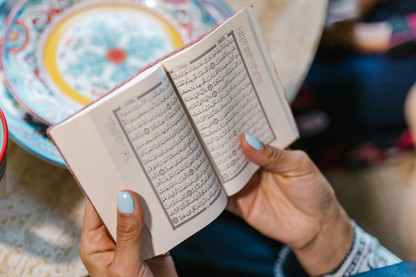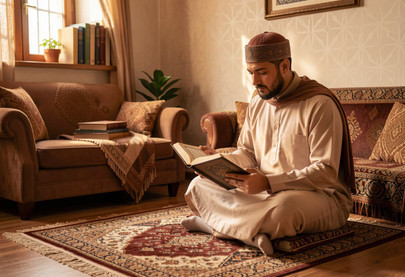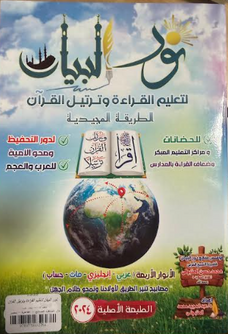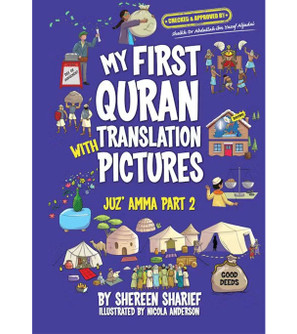Essential Arabic Pronunciation Guide with Phrases, Sounds, and Resources
We understand that learning a new language can be hard, especially when it's the language of the Holy Quran and of Prophet Muhammad (peace be upon him).
But don’t worry. Many people believe Arabic learning is difficult, but that’s not true. It’s actually one of the easier languages to learn and implement. And with the right help, it becomes even simpler.
In this guide, we will walk you through important categories from the Quran and classical Arabic. We’ll also cover words from other cultures and modern use, so you get a wider view of how Arabic works today.
You’ll see how to say these words correctly. We’ll also share helpful links from Madinah Media, Madinah Mart, and Studio Arabiya. These will support your practice and make Arabic pronunciation more manageable.
Now, grab a plate of something good, maybe a well-known Arabic dish and begin. This language is rich, beautiful, and easier than you might think.
Important Arabic Pronunciation Points
If you want to understand Arabic pronunciation well, you must first know its alphabet and the marks that affect its sounds.
A. Arabic Alphabet Differences
Arabic has 28 letters. All are consonants except three: (أ, و, ي). These three can also act as vowels. It depends on how they are used and the marks around them.
Guttural Sounds
Some letters come from the back of the throat. These need muscle control that other languages don’t use. Examples include:
- ع (‘Ayn): a deep, throaty sound. It does not exist in English.
- ق (Qāf): a "k" sound made deep in the throat.
- ح (Ḥā): a soft "h" sound. It feels more breathy than the English "h".
Emphatic Sounds
Arabic includes heavier forms of some letters. These are stronger in sound. For example:
- ط (ṭā) and ت (tā)
- ض (ḍād) and د (dāl)
- ص (ṣād) and س (sīn)
- ظ (ẓā) and ذ (dhāl)
You may need to raise your tongue or shape it differently to say these correctly.
B. Diacritics (Harakat)
Harakat are small marks above or below letters. They guide how to say each letter. They show short vowels, no vowels, or double sounds. You must know them to speak clearly.
- Fatha: a small diagonal line above the letter. It gives a short "a" sound.
- Sukoon: a small circle above the letter. It means no vowel comes after it.
- Shaddah: a small "w"-shaped mark. It shows the letter is said with more force or twice.
If this still feels unclear, we recommend this course for beginners and this one for kids. These programs explain all the basics and show how to use harakat, step by step. The teachers speak clearly and make things easy to follow.
How Pronouncing Common Arabic Phrases Helps Your Arabic Learning
Many people think grammar comes first. But in Arabic learning, saying common phrases the right way helps you much more. Here’s why:
1. You Speak with Confidence
When you know useful phrases, you speak without fear. You can ask for food, find your way, or greet someone with ease. For example:
- As-salāmu ʿalaykum – Peace be upon you
- Kam hādhā? – How much is this?
- Shukran – Thank you
You will sound natural. That matters whether you are in Cairo, Makkah, or Casablanca.
2. You Talk to Real People
If you go for Umrah or visit a Muslim country, these phrases help you speak to locals. You can take a taxi, ask for prices, and reply politely in shops and markets.
For example, if a driver says, "Kam il-masāfa?" (How far is it?), you can respond. This makes your trip smoother.
3. You Train Your Brain
Saying new Arabic words improves your focus. It also helps your memory. Each time you pronounce a new word, your brain makes new connections.
You don’t need to memorize everything. Just keep repeating words like:
- Bismi Allāh – In the name of Allah
- Alḥamdu lillāh – All praise is for Allah
- Subḥān Allāh – Glory be to Allah
These words improve both your speech and your mental sharpness.
Basic Everyday Arabic Phrases
Essential for polite, daily interactions in any Arabic-speaking environment:
|
Arabic Phrase |
English Meaning |
Pronunciation |
|
السلام عليكم |
Peace be upon you |
As-salāmu ʿalaykum |
|
وعليكم السلام |
And peace be upon you too |
Wa ʿalaykum as-salām |
|
شكراً |
Thank you |
Shukran |
|
عفواً |
You're welcome |
ʿAfwan |
|
نعم |
Yes |
Naʿam |
|
لا |
No |
Lā |
|
من فضلك |
Please |
Min faḍlik |
|
أنا آسف |
I'm sorry |
Ana ʾāsif |
|
حسناً |
Okay |
Ḥasanan |
|
ما اسمك؟ |
What’s your name? |
Mā ismuk? |
If you want to understand Arabic numbers easily, here’s the book we recommend: My Arabic Numbers
2. Funny & Casual Arabic Expressions
Fun, friendly, and frequently heard in casual Arab conversations:
|
Phrase |
Meaning |
Notes |
|
شوية شوية |
Slowly slowly |
Common among learners, amusing to locals |
|
مش مشكلة |
No problem |
Said in almost any situation |
|
خلاص |
That’s it / Enough |
Final word in a conversation |
|
يلا |
Let’s go / Hurry |
Expressive and widely used |
|
حبيبي / حبيبتي |
My dear / darling |
Used platonically too |
3. Religious & Formal Arabic Phrases
Used in prayer, Islamic gatherings, or when reciting Qur’an:
|
Arabic Phrase |
English Meaning |
Pronunciation |
|
بسم الله |
In the name of Allah |
Bismi Allāh |
|
جزاك الله خيرا |
May Allah reward you |
Jazak Allāhu khayran |
|
إن شاء الله |
If Allah wills |
In shā’ Allāh |
|
ما شاء الله |
What Allah has willed |
Mā shā’ Allāh |
|
الحمد لله |
All praise is due to Allah |
Al-ḥamdu lillāh |
|
الله أكبر |
Allah is the greatest |
Allāhu akbar |
|
سبحان الله |
Glory be to Allah |
Subḥān Allāh |
For Tajweed practice and Qur’anic pronunciation, check out this course: Tajweed Recitation for Adults
4. Common Arabic Question Phrases
These help you engage in conversations and ask for help:
|
Arabic |
English |
Pronunciation |
|
من أين أنت؟ |
Where are you from? |
Min ayna anta? (m), anti? (f) |
|
أين تسكن؟ |
Where do you live? |
Ayna taskun? |
|
كم عمرك؟ |
How old are you? |
Kam ʿumruk? |
|
هل تتكلم الإنجليزية؟ |
Do you speak English? |
Hal tatakallam al-inglīziyyah? |
|
كم هذا؟ |
How much is this? |
Kam hādhā? |
|
ما هذا؟ |
What is this? |
Mā hādhā? |
|
متى؟ |
When? |
Matā? |
|
كيف؟ |
How? |
Kayfa? |
|
لماذا؟ |
Why? |
Limādhā? |
Learn more about these and other questions in this book: Arabic Letters Book
5. Regional Arabic: Egypt & Morocco
Egyptian Arabic (Masri):
- "إزيّك؟" (Izzayyak?) — How are you?
- "ماشي" (Mashy) — Okay
- "فين؟" (Fein?) — Where?
- "تمام" (Tamaam) — All good
Moroccan Arabic (Darija):
- "شنو سميتك؟" (Shnu smiytek?) — What’s your name?
- "كيداير؟" (Kidayr?) — How are you?
- "واخة" (Wakha) — Okay
- "بزاف" (Bzaaf) — A lot/very much
Tips to Pronounce New Arabic Words For Arabic Learning
Listen Daily
Listen to native Arabic speakers through recitations, podcasts, songs, or news. This helps you get used to the correct sound of each word.
Practice Articulation Points
Try to focus on difficult sounds like ʿayn (ع), khāʾ (خ), ḥāʾ (ح), and qāf (ق). Use a mirror or record yourself to check your pronunciation.
Use Flashcards with Audio
Use flashcards that include fatha, dhamma, and sukoon. This improves muscle memory and helps you say words more accurately.
Speak Loudly
Use common Arabic words like As-salāmu ʿalaykum, Bismi Allāh, or Shukran in your daily routine. This helps you speak with ease and builds fluency in simple phrases.
If you want to read and say Arabic words with confidence, check out this product: First 50 Arabic Words. It focuses on the most useful words for everyday speech.
Get Feedback from a Tutor
Practice only improves when you get feedback. A tutor can correct your mistakes. You can hire a tutor online or visit your local mosque. Many clerics teach Arabic basics for free or at a low cost.
Recommended Resources for Arabic Learning and Pronunciation
If you’re tired of struggling to find trusted resources for learning Arabic, we recommend checking out the platforms below. Hundreds of thousands of learners have used their courses and books and seen great results.
Madinah Media:
A well-known site for Arabic learning and Islamic books. It offers thousands of titles. Topics include the Quran, modern Arabic language, Islamic history and many more.
Madinah Mart:
Great for both Arabic learners and the wider Muslim community, this site offers everything from home decor products to Arabic learning products. For example, you can get these flash cards designed to help you learn and pronounce common Arabic words with ease.
Studio Arabiya:
This platform offers both free resources and full courses to help you go from beginner to advanced level. Their Arabic programs are properly designed and led by experienced teachers.
That’s it from us. We’ve given you a list of the most important and commonly used pronunciation techniques and phrases in Arabic. They will be helpful if you’re traveling to an Arabic country, reciting the Holy Quran, or even listening to hadith in Arabic. Of course, they will also be useful in your Arabic learning journey.
All of these words and phrases, along with pure classical Arabic, are taught by native Arabic instructors through this Arabic Fusha course for adults. The course is easy to follow and practical to apply.
We hope you found this guide helpful and that it has introduced you to many Arabic words which you can use for both Quranic recitation and everyday conversation.
















